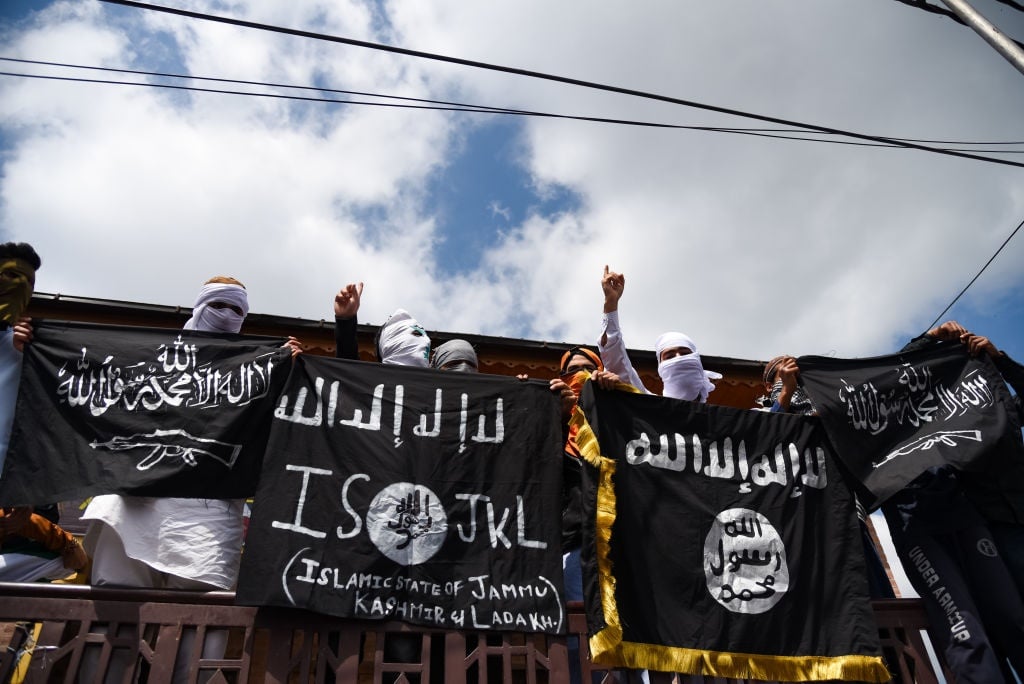


Protesters waving ISIS flags in Sringaar.
- ISIS has warned South Africa not to get involved in the conflict in Mozambique’s northernmost province.
- The DA wants Defence Minister Nosiviwe Mapisa-Nqakula to meet with the SADC.
- Mapisa-Nqakula has previously been wary to speak about the matter in public.
ISIS has warned South Africa that it would “open the fighting front” within South Africa’s borders, should it get involved in Mozambique’s Cabo Delgado province.
This is according to reports on ISIS’s latest newsletter, Al-Naba.
An organisation linked to ISIS, Ahlu Sunnah Wal Jamaah, has been waging a violent insurgency in Mozambique’s northernmost province, Cabo Delgado.
It started in 2017, but the violence has escalated in recent months. They want to establish an extremist form of Islamic law in the province, even though their motives have been questioned by some as more compelled by greed.
READ | Growing terrorism in Mozambique
In its newsletter, which is published in Arabic, ISIS reportedly wrote that European and American states are trying to convince South Africa to lead the war in Mozambique.
South Africa, though, has enough of its own problems and war will put it in a great financial and military predicament. It states further that South Africa’s military involvement might prompt ISIS soldiers to start fighting within its borders.
On Tuesday, DA MP Kobus Marais called on the Minister of Defence and Military Veterans, Nosiviwe Mapisa-Nqakula, to urgently engage her counterparts in the Southern African Development Community (SADC) regarding the increasing ISIS threat.
Threat
“South Africa cannot afford to ignore this threat from ISIS or take its warning lightly. As a member of both SADC and the African Union (AU), we have an obligation to safeguard the stability of our country and our neighbours,” Marais said.
“The minister needs to also play open cards with South Africans and be honest about the threat facing our neighbouring nation. Mozambique is a popular holiday destination, and many South Africans have friends or family living and working in Mozambique.
“With the duel threat of ISIS and Covid-19 plaquing the country, transparency from the minister will go a long way in alleviating the extra worry the situation might cause South Africans,” he said.
READ | Mapisa-Nqakula defends selling arms to Turkey
Mapisa-Nqakula has previously been wary to speak on the matter.
At a meeting of the Portfolio Committee on Defence last month, Marais asked whether South Africa’s Special Forces were training in the north of Durban for possible deployment in Mozambique, given that the Minister of International Relations and Cooperation, Naledi Pandor, recently said South Africa was in discussions with Mozambique about helping in the conflict with ISIS.
Secretary of Defence Sam Gulube said Special Forces’ operations were classified and perhaps the committee could arrange that it was “discussed under closed doors”.
Challenges
When Mapisa-Nqakula answered the committee’s questions, she confirmed with its chairperson the meeting was open to the public, and then said she would not speak about Mozambique.
“There are challenges with Mozambique. Yes, there are,” she said.
“Whether Mozambique asked for help is another matter.”
Later in June, in a written response to a parliamentary question, Mapisa-Nqakula gave the first public expression of concern from the government that the violence in Mozambique could spread.
“Defence Intelligence can confirm that there is an increase of Islamic insurgency activities currently in the province of Cabo Delgado, Mozambique, and these have the potential to spread to other provinces and neighbouring Southern African Development Community states,” read Mapisa-Nqakula’s answer.
“As the Islamic insurgency activities may affect some SADC states, the regional political and military approach has been recommended and, to this effect, plans are in place to discuss and concretise the approach.”
News24 approached the ministries of defence and of international relations and cooperation for further comment, which will be published once received.

